Insolvency Law in Australia: Directors' Liabilities and Duties
VerifiedAdded on 2020/03/23
|8
|2483
|118
Essay
AI Summary
This essay provides a comprehensive overview of Australian insolvency law, focusing on the Corporations Act 2001 and the responsibilities and liabilities of company directors. It examines key aspects such as insolvent trading, director's duties to prevent company debts, and the potential for legal action against directors who fail to fulfill their obligations. The essay delves into the early signs of insolvency, as identified by ASIC, and explores the consequences of breaching director's duties, including civil and criminal liabilities. It also explains the different types of winding-up processes, including voluntary and compulsory liquidation, and the role of liquidators in recovering assets and distributing them to creditors. Furthermore, the essay discusses external administration methods like voluntary administration (VA), receivership, and the implementation of a Deed of Company Arrangement (DOCA), highlighting their advantages and objectives. The essay concludes by emphasizing the importance of adhering to the provisions of the Corporations Act 2001 to manage the legal and financial aspects of insolvency and protect the interests of all stakeholders. This essay is a contribution to Desklib, a platform offering AI-based study tools for students.
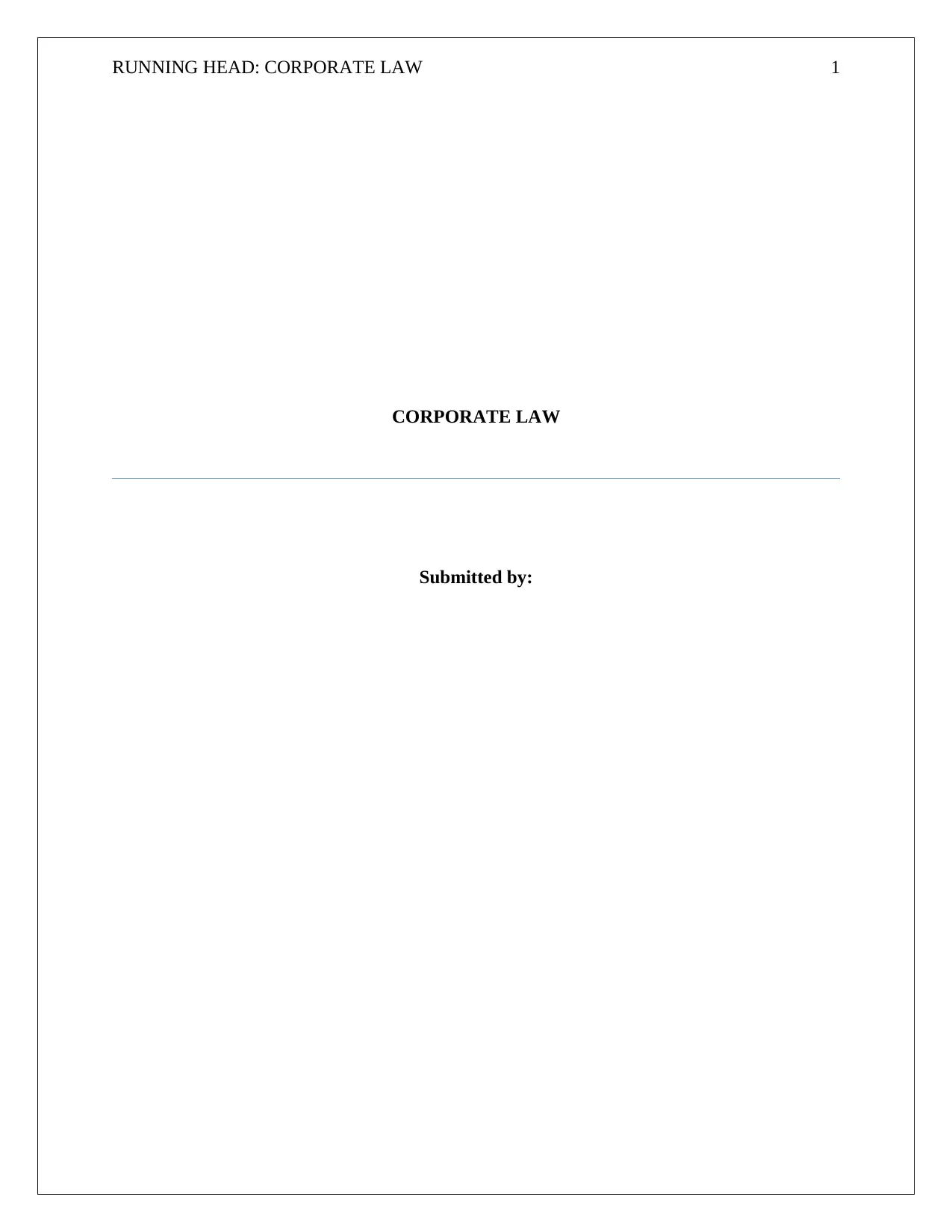
RUNNING HEAD: CORPORATE LAW 1
CORPORATE LAW
Submitted by:
CORPORATE LAW
Submitted by:
Paraphrase This Document
Need a fresh take? Get an instant paraphrase of this document with our AI Paraphraser
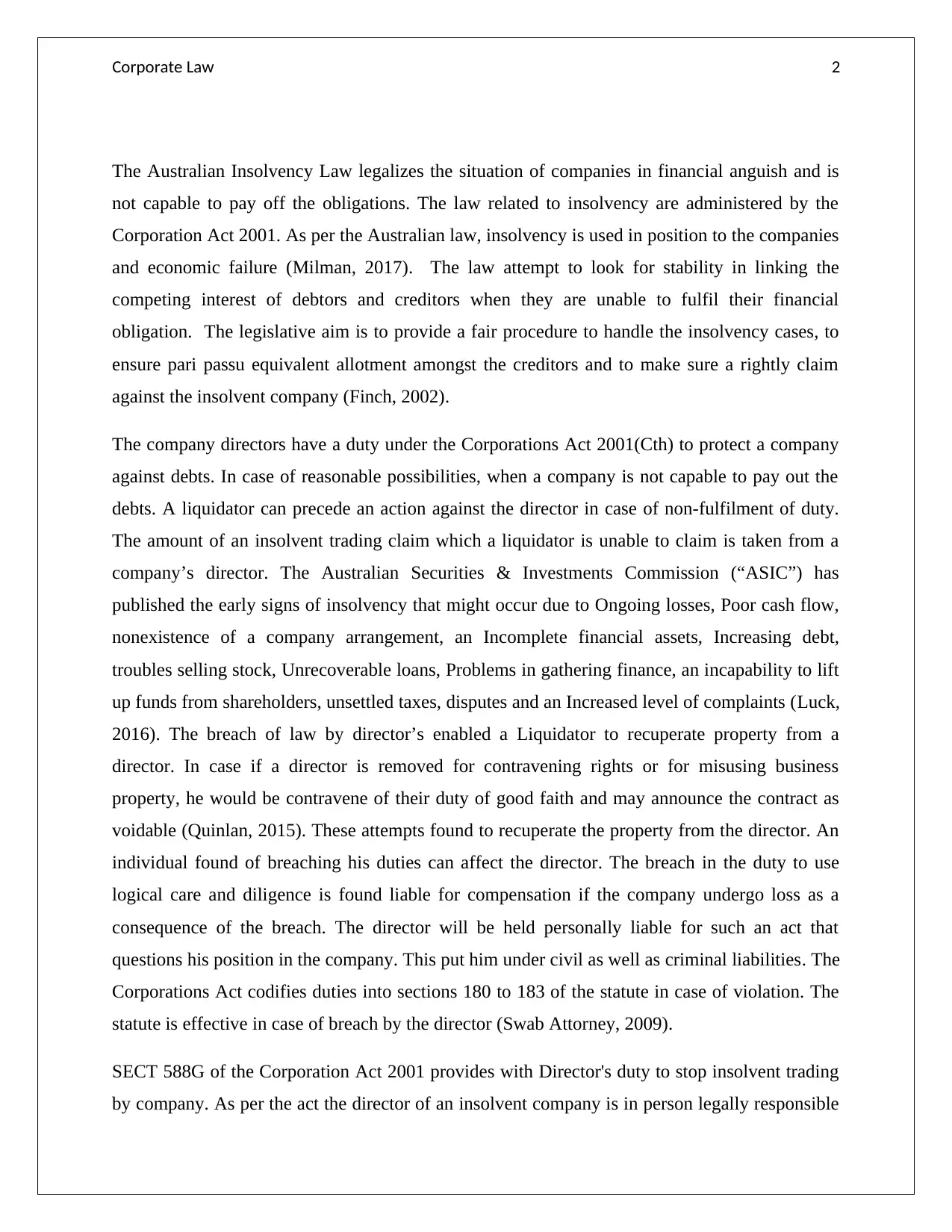
Corporate Law 2
The Australian Insolvency Law legalizes the situation of companies in financial anguish and is
not capable to pay off the obligations. The law related to insolvency are administered by the
Corporation Act 2001. As per the Australian law, insolvency is used in position to the companies
and economic failure (Milman, 2017). The law attempt to look for stability in linking the
competing interest of debtors and creditors when they are unable to fulfil their financial
obligation. The legislative aim is to provide a fair procedure to handle the insolvency cases, to
ensure pari passu equivalent allotment amongst the creditors and to make sure a rightly claim
against the insolvent company (Finch, 2002).
The company directors have a duty under the Corporations Act 2001(Cth) to protect a company
against debts. In case of reasonable possibilities, when a company is not capable to pay out the
debts. A liquidator can precede an action against the director in case of non-fulfilment of duty.
The amount of an insolvent trading claim which a liquidator is unable to claim is taken from a
company’s director. The Australian Securities & Investments Commission (“ASIC”) has
published the early signs of insolvency that might occur due to Ongoing losses, Poor cash flow,
nonexistence of a company arrangement, an Incomplete financial assets, Increasing debt,
troubles selling stock, Unrecoverable loans, Problems in gathering finance, an incapability to lift
up funds from shareholders, unsettled taxes, disputes and an Increased level of complaints (Luck,
2016). The breach of law by director’s enabled a Liquidator to recuperate property from a
director. In case if a director is removed for contravening rights or for misusing business
property, he would be contravene of their duty of good faith and may announce the contract as
voidable (Quinlan, 2015). These attempts found to recuperate the property from the director. An
individual found of breaching his duties can affect the director. The breach in the duty to use
logical care and diligence is found liable for compensation if the company undergo loss as a
consequence of the breach. The director will be held personally liable for such an act that
questions his position in the company. This put him under civil as well as criminal liabilities. The
Corporations Act codifies duties into sections 180 to 183 of the statute in case of violation. The
statute is effective in case of breach by the director (Swab Attorney, 2009).
SECT 588G of the Corporation Act 2001 provides with Director's duty to stop insolvent trading
by company. As per the act the director of an insolvent company is in person legally responsible
The Australian Insolvency Law legalizes the situation of companies in financial anguish and is
not capable to pay off the obligations. The law related to insolvency are administered by the
Corporation Act 2001. As per the Australian law, insolvency is used in position to the companies
and economic failure (Milman, 2017). The law attempt to look for stability in linking the
competing interest of debtors and creditors when they are unable to fulfil their financial
obligation. The legislative aim is to provide a fair procedure to handle the insolvency cases, to
ensure pari passu equivalent allotment amongst the creditors and to make sure a rightly claim
against the insolvent company (Finch, 2002).
The company directors have a duty under the Corporations Act 2001(Cth) to protect a company
against debts. In case of reasonable possibilities, when a company is not capable to pay out the
debts. A liquidator can precede an action against the director in case of non-fulfilment of duty.
The amount of an insolvent trading claim which a liquidator is unable to claim is taken from a
company’s director. The Australian Securities & Investments Commission (“ASIC”) has
published the early signs of insolvency that might occur due to Ongoing losses, Poor cash flow,
nonexistence of a company arrangement, an Incomplete financial assets, Increasing debt,
troubles selling stock, Unrecoverable loans, Problems in gathering finance, an incapability to lift
up funds from shareholders, unsettled taxes, disputes and an Increased level of complaints (Luck,
2016). The breach of law by director’s enabled a Liquidator to recuperate property from a
director. In case if a director is removed for contravening rights or for misusing business
property, he would be contravene of their duty of good faith and may announce the contract as
voidable (Quinlan, 2015). These attempts found to recuperate the property from the director. An
individual found of breaching his duties can affect the director. The breach in the duty to use
logical care and diligence is found liable for compensation if the company undergo loss as a
consequence of the breach. The director will be held personally liable for such an act that
questions his position in the company. This put him under civil as well as criminal liabilities. The
Corporations Act codifies duties into sections 180 to 183 of the statute in case of violation. The
statute is effective in case of breach by the director (Swab Attorney, 2009).
SECT 588G of the Corporation Act 2001 provides with Director's duty to stop insolvent trading
by company. As per the act the director of an insolvent company is in person legally responsible
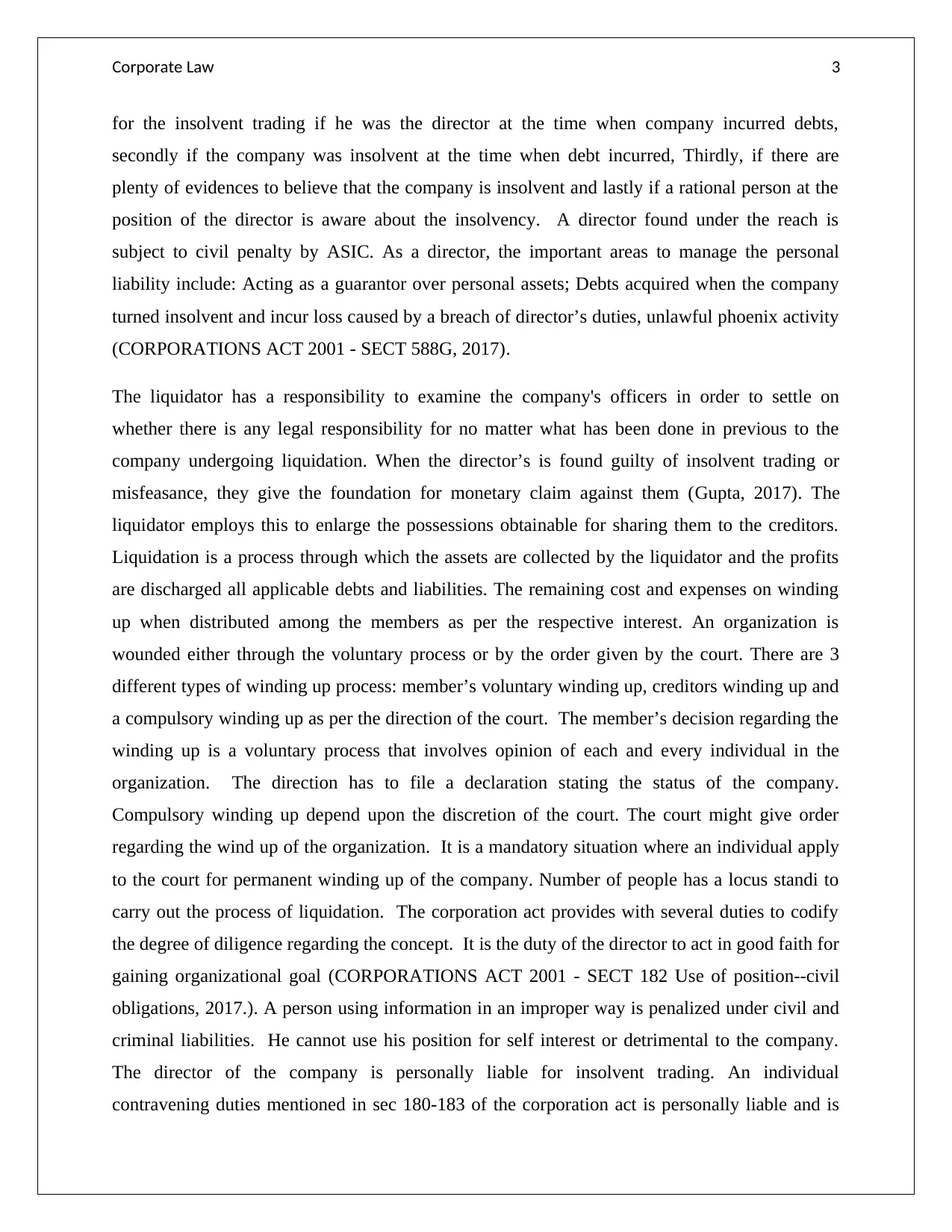
Corporate Law 3
for the insolvent trading if he was the director at the time when company incurred debts,
secondly if the company was insolvent at the time when debt incurred, Thirdly, if there are
plenty of evidences to believe that the company is insolvent and lastly if a rational person at the
position of the director is aware about the insolvency. A director found under the reach is
subject to civil penalty by ASIC. As a director, the important areas to manage the personal
liability include: Acting as a guarantor over personal assets; Debts acquired when the company
turned insolvent and incur loss caused by a breach of director’s duties, unlawful phoenix activity
(CORPORATIONS ACT 2001 - SECT 588G, 2017).
The liquidator has a responsibility to examine the company's officers in order to settle on
whether there is any legal responsibility for no matter what has been done in previous to the
company undergoing liquidation. When the director’s is found guilty of insolvent trading or
misfeasance, they give the foundation for monetary claim against them (Gupta, 2017). The
liquidator employs this to enlarge the possessions obtainable for sharing them to the creditors.
Liquidation is a process through which the assets are collected by the liquidator and the profits
are discharged all applicable debts and liabilities. The remaining cost and expenses on winding
up when distributed among the members as per the respective interest. An organization is
wounded either through the voluntary process or by the order given by the court. There are 3
different types of winding up process: member’s voluntary winding up, creditors winding up and
a compulsory winding up as per the direction of the court. The member’s decision regarding the
winding up is a voluntary process that involves opinion of each and every individual in the
organization. The direction has to file a declaration stating the status of the company.
Compulsory winding up depend upon the discretion of the court. The court might give order
regarding the wind up of the organization. It is a mandatory situation where an individual apply
to the court for permanent winding up of the company. Number of people has a locus standi to
carry out the process of liquidation. The corporation act provides with several duties to codify
the degree of diligence regarding the concept. It is the duty of the director to act in good faith for
gaining organizational goal (CORPORATIONS ACT 2001 - SECT 182 Use of position--civil
obligations, 2017.). A person using information in an improper way is penalized under civil and
criminal liabilities. He cannot use his position for self interest or detrimental to the company.
The director of the company is personally liable for insolvent trading. An individual
contravening duties mentioned in sec 180-183 of the corporation act is personally liable and is
for the insolvent trading if he was the director at the time when company incurred debts,
secondly if the company was insolvent at the time when debt incurred, Thirdly, if there are
plenty of evidences to believe that the company is insolvent and lastly if a rational person at the
position of the director is aware about the insolvency. A director found under the reach is
subject to civil penalty by ASIC. As a director, the important areas to manage the personal
liability include: Acting as a guarantor over personal assets; Debts acquired when the company
turned insolvent and incur loss caused by a breach of director’s duties, unlawful phoenix activity
(CORPORATIONS ACT 2001 - SECT 588G, 2017).
The liquidator has a responsibility to examine the company's officers in order to settle on
whether there is any legal responsibility for no matter what has been done in previous to the
company undergoing liquidation. When the director’s is found guilty of insolvent trading or
misfeasance, they give the foundation for monetary claim against them (Gupta, 2017). The
liquidator employs this to enlarge the possessions obtainable for sharing them to the creditors.
Liquidation is a process through which the assets are collected by the liquidator and the profits
are discharged all applicable debts and liabilities. The remaining cost and expenses on winding
up when distributed among the members as per the respective interest. An organization is
wounded either through the voluntary process or by the order given by the court. There are 3
different types of winding up process: member’s voluntary winding up, creditors winding up and
a compulsory winding up as per the direction of the court. The member’s decision regarding the
winding up is a voluntary process that involves opinion of each and every individual in the
organization. The direction has to file a declaration stating the status of the company.
Compulsory winding up depend upon the discretion of the court. The court might give order
regarding the wind up of the organization. It is a mandatory situation where an individual apply
to the court for permanent winding up of the company. Number of people has a locus standi to
carry out the process of liquidation. The corporation act provides with several duties to codify
the degree of diligence regarding the concept. It is the duty of the director to act in good faith for
gaining organizational goal (CORPORATIONS ACT 2001 - SECT 182 Use of position--civil
obligations, 2017.). A person using information in an improper way is penalized under civil and
criminal liabilities. He cannot use his position for self interest or detrimental to the company.
The director of the company is personally liable for insolvent trading. An individual
contravening duties mentioned in sec 180-183 of the corporation act is personally liable and is
⊘ This is a preview!⊘
Do you want full access?
Subscribe today to unlock all pages.

Trusted by 1+ million students worldwide
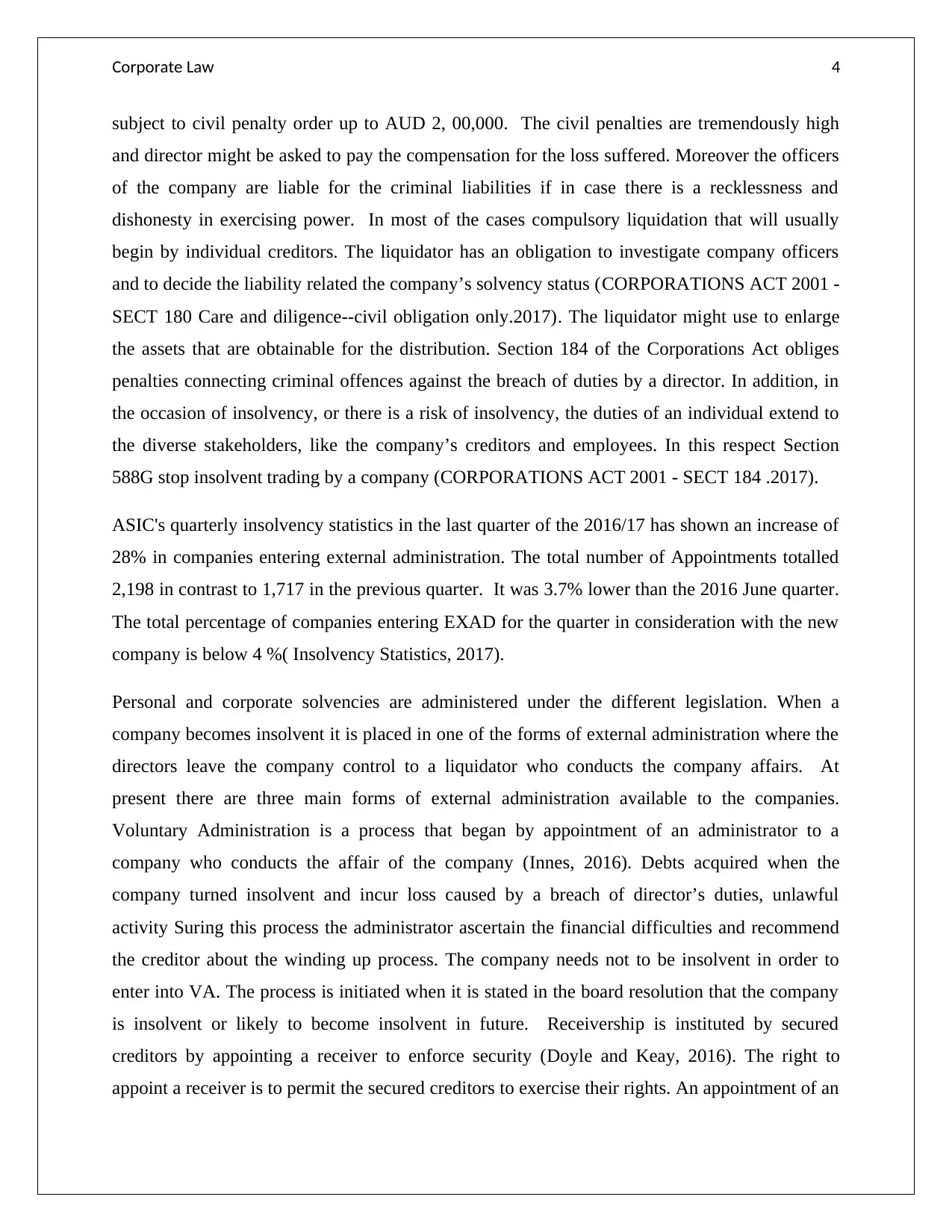
Corporate Law 4
subject to civil penalty order up to AUD 2, 00,000. The civil penalties are tremendously high
and director might be asked to pay the compensation for the loss suffered. Moreover the officers
of the company are liable for the criminal liabilities if in case there is a recklessness and
dishonesty in exercising power. In most of the cases compulsory liquidation that will usually
begin by individual creditors. The liquidator has an obligation to investigate company officers
and to decide the liability related the company’s solvency status (CORPORATIONS ACT 2001 -
SECT 180 Care and diligence--civil obligation only.2017). The liquidator might use to enlarge
the assets that are obtainable for the distribution. Section 184 of the Corporations Act obliges
penalties connecting criminal offences against the breach of duties by a director. In addition, in
the occasion of insolvency, or there is a risk of insolvency, the duties of an individual extend to
the diverse stakeholders, like the company’s creditors and employees. In this respect Section
588G stop insolvent trading by a company (CORPORATIONS ACT 2001 - SECT 184 .2017).
ASIC's quarterly insolvency statistics in the last quarter of the 2016/17 has shown an increase of
28% in companies entering external administration. The total number of Appointments totalled
2,198 in contrast to 1,717 in the previous quarter. It was 3.7% lower than the 2016 June quarter.
The total percentage of companies entering EXAD for the quarter in consideration with the new
company is below 4 %( Insolvency Statistics, 2017).
Personal and corporate solvencies are administered under the different legislation. When a
company becomes insolvent it is placed in one of the forms of external administration where the
directors leave the company control to a liquidator who conducts the company affairs. At
present there are three main forms of external administration available to the companies.
Voluntary Administration is a process that began by appointment of an administrator to a
company who conducts the affair of the company (Innes, 2016). Debts acquired when the
company turned insolvent and incur loss caused by a breach of director’s duties, unlawful
activity Suring this process the administrator ascertain the financial difficulties and recommend
the creditor about the winding up process. The company needs not to be insolvent in order to
enter into VA. The process is initiated when it is stated in the board resolution that the company
is insolvent or likely to become insolvent in future. Receivership is instituted by secured
creditors by appointing a receiver to enforce security (Doyle and Keay, 2016). The right to
appoint a receiver is to permit the secured creditors to exercise their rights. An appointment of an
subject to civil penalty order up to AUD 2, 00,000. The civil penalties are tremendously high
and director might be asked to pay the compensation for the loss suffered. Moreover the officers
of the company are liable for the criminal liabilities if in case there is a recklessness and
dishonesty in exercising power. In most of the cases compulsory liquidation that will usually
begin by individual creditors. The liquidator has an obligation to investigate company officers
and to decide the liability related the company’s solvency status (CORPORATIONS ACT 2001 -
SECT 180 Care and diligence--civil obligation only.2017). The liquidator might use to enlarge
the assets that are obtainable for the distribution. Section 184 of the Corporations Act obliges
penalties connecting criminal offences against the breach of duties by a director. In addition, in
the occasion of insolvency, or there is a risk of insolvency, the duties of an individual extend to
the diverse stakeholders, like the company’s creditors and employees. In this respect Section
588G stop insolvent trading by a company (CORPORATIONS ACT 2001 - SECT 184 .2017).
ASIC's quarterly insolvency statistics in the last quarter of the 2016/17 has shown an increase of
28% in companies entering external administration. The total number of Appointments totalled
2,198 in contrast to 1,717 in the previous quarter. It was 3.7% lower than the 2016 June quarter.
The total percentage of companies entering EXAD for the quarter in consideration with the new
company is below 4 %( Insolvency Statistics, 2017).
Personal and corporate solvencies are administered under the different legislation. When a
company becomes insolvent it is placed in one of the forms of external administration where the
directors leave the company control to a liquidator who conducts the company affairs. At
present there are three main forms of external administration available to the companies.
Voluntary Administration is a process that began by appointment of an administrator to a
company who conducts the affair of the company (Innes, 2016). Debts acquired when the
company turned insolvent and incur loss caused by a breach of director’s duties, unlawful
activity Suring this process the administrator ascertain the financial difficulties and recommend
the creditor about the winding up process. The company needs not to be insolvent in order to
enter into VA. The process is initiated when it is stated in the board resolution that the company
is insolvent or likely to become insolvent in future. Receivership is instituted by secured
creditors by appointing a receiver to enforce security (Doyle and Keay, 2016). The right to
appoint a receiver is to permit the secured creditors to exercise their rights. An appointment of an
Paraphrase This Document
Need a fresh take? Get an instant paraphrase of this document with our AI Paraphraser
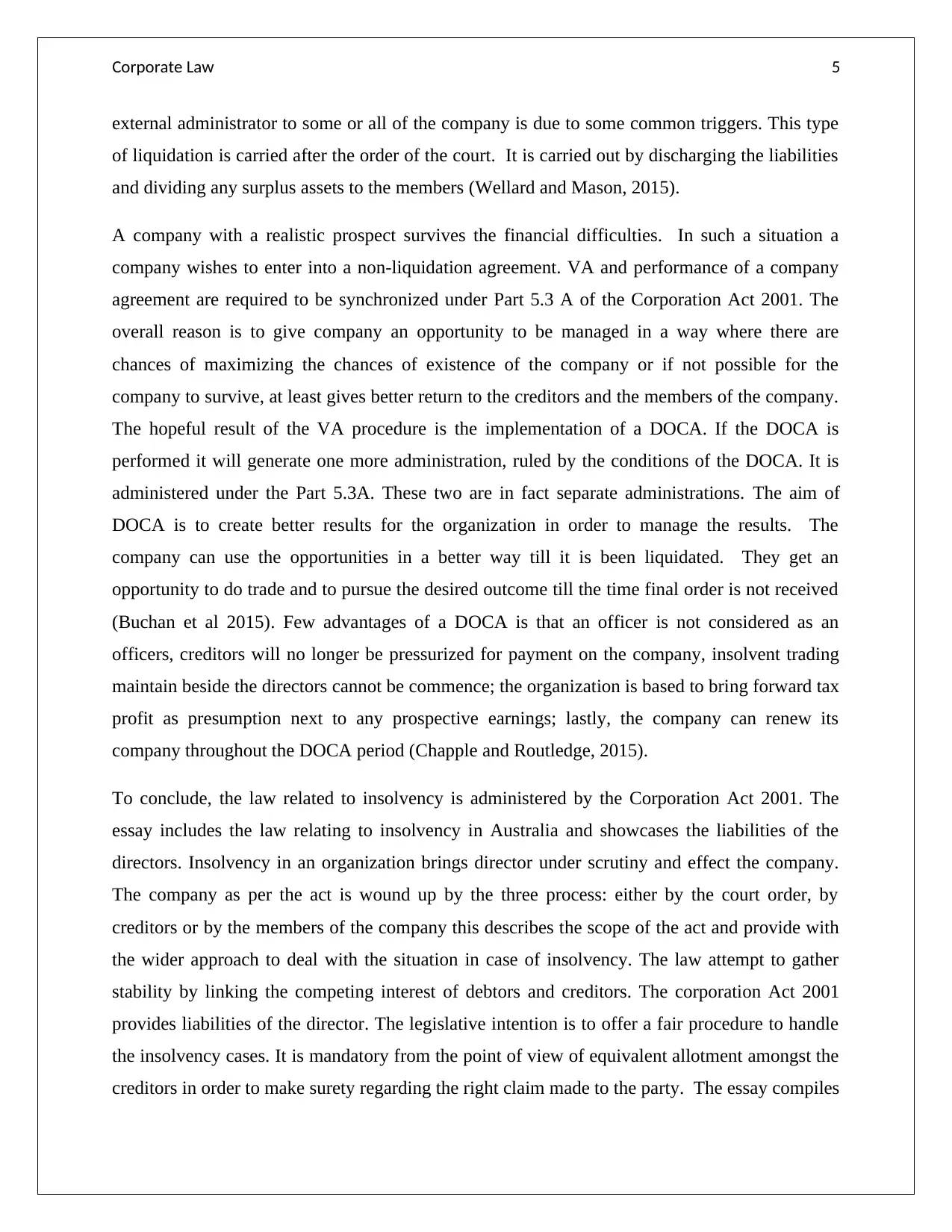
Corporate Law 5
external administrator to some or all of the company is due to some common triggers. This type
of liquidation is carried after the order of the court. It is carried out by discharging the liabilities
and dividing any surplus assets to the members (Wellard and Mason, 2015).
A company with a realistic prospect survives the financial difficulties. In such a situation a
company wishes to enter into a non-liquidation agreement. VA and performance of a company
agreement are required to be synchronized under Part 5.3 A of the Corporation Act 2001. The
overall reason is to give company an opportunity to be managed in a way where there are
chances of maximizing the chances of existence of the company or if not possible for the
company to survive, at least gives better return to the creditors and the members of the company.
The hopeful result of the VA procedure is the implementation of a DOCA. If the DOCA is
performed it will generate one more administration, ruled by the conditions of the DOCA. It is
administered under the Part 5.3A. These two are in fact separate administrations. The aim of
DOCA is to create better results for the organization in order to manage the results. The
company can use the opportunities in a better way till it is been liquidated. They get an
opportunity to do trade and to pursue the desired outcome till the time final order is not received
(Buchan et al 2015). Few advantages of a DOCA is that an officer is not considered as an
officers, creditors will no longer be pressurized for payment on the company, insolvent trading
maintain beside the directors cannot be commence; the organization is based to bring forward tax
profit as presumption next to any prospective earnings; lastly, the company can renew its
company throughout the DOCA period (Chapple and Routledge, 2015).
To conclude, the law related to insolvency is administered by the Corporation Act 2001. The
essay includes the law relating to insolvency in Australia and showcases the liabilities of the
directors. Insolvency in an organization brings director under scrutiny and effect the company.
The company as per the act is wound up by the three process: either by the court order, by
creditors or by the members of the company this describes the scope of the act and provide with
the wider approach to deal with the situation in case of insolvency. The law attempt to gather
stability by linking the competing interest of debtors and creditors. The corporation Act 2001
provides liabilities of the director. The legislative intention is to offer a fair procedure to handle
the insolvency cases. It is mandatory from the point of view of equivalent allotment amongst the
creditors in order to make surety regarding the right claim made to the party. The essay compiles
external administrator to some or all of the company is due to some common triggers. This type
of liquidation is carried after the order of the court. It is carried out by discharging the liabilities
and dividing any surplus assets to the members (Wellard and Mason, 2015).
A company with a realistic prospect survives the financial difficulties. In such a situation a
company wishes to enter into a non-liquidation agreement. VA and performance of a company
agreement are required to be synchronized under Part 5.3 A of the Corporation Act 2001. The
overall reason is to give company an opportunity to be managed in a way where there are
chances of maximizing the chances of existence of the company or if not possible for the
company to survive, at least gives better return to the creditors and the members of the company.
The hopeful result of the VA procedure is the implementation of a DOCA. If the DOCA is
performed it will generate one more administration, ruled by the conditions of the DOCA. It is
administered under the Part 5.3A. These two are in fact separate administrations. The aim of
DOCA is to create better results for the organization in order to manage the results. The
company can use the opportunities in a better way till it is been liquidated. They get an
opportunity to do trade and to pursue the desired outcome till the time final order is not received
(Buchan et al 2015). Few advantages of a DOCA is that an officer is not considered as an
officers, creditors will no longer be pressurized for payment on the company, insolvent trading
maintain beside the directors cannot be commence; the organization is based to bring forward tax
profit as presumption next to any prospective earnings; lastly, the company can renew its
company throughout the DOCA period (Chapple and Routledge, 2015).
To conclude, the law related to insolvency is administered by the Corporation Act 2001. The
essay includes the law relating to insolvency in Australia and showcases the liabilities of the
directors. Insolvency in an organization brings director under scrutiny and effect the company.
The company as per the act is wound up by the three process: either by the court order, by
creditors or by the members of the company this describes the scope of the act and provide with
the wider approach to deal with the situation in case of insolvency. The law attempt to gather
stability by linking the competing interest of debtors and creditors. The corporation Act 2001
provides liabilities of the director. The legislative intention is to offer a fair procedure to handle
the insolvency cases. It is mandatory from the point of view of equivalent allotment amongst the
creditors in order to make surety regarding the right claim made to the party. The essay compiles
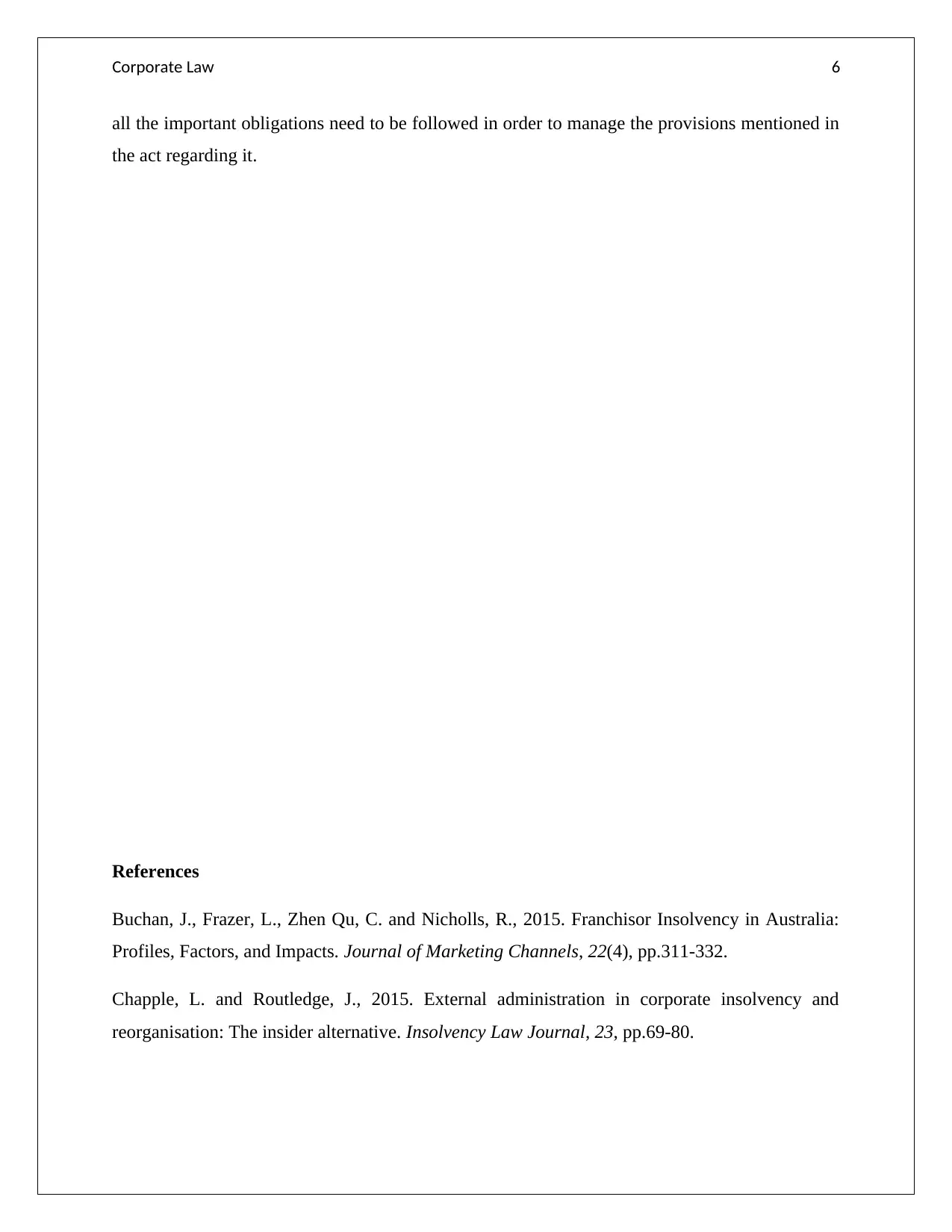
Corporate Law 6
all the important obligations need to be followed in order to manage the provisions mentioned in
the act regarding it.
References
Buchan, J., Frazer, L., Zhen Qu, C. and Nicholls, R., 2015. Franchisor Insolvency in Australia:
Profiles, Factors, and Impacts. Journal of Marketing Channels, 22(4), pp.311-332.
Chapple, L. and Routledge, J., 2015. External administration in corporate insolvency and
reorganisation: The insider alternative. Insolvency Law Journal, 23, pp.69-80.
all the important obligations need to be followed in order to manage the provisions mentioned in
the act regarding it.
References
Buchan, J., Frazer, L., Zhen Qu, C. and Nicholls, R., 2015. Franchisor Insolvency in Australia:
Profiles, Factors, and Impacts. Journal of Marketing Channels, 22(4), pp.311-332.
Chapple, L. and Routledge, J., 2015. External administration in corporate insolvency and
reorganisation: The insider alternative. Insolvency Law Journal, 23, pp.69-80.
⊘ This is a preview!⊘
Do you want full access?
Subscribe today to unlock all pages.

Trusted by 1+ million students worldwide
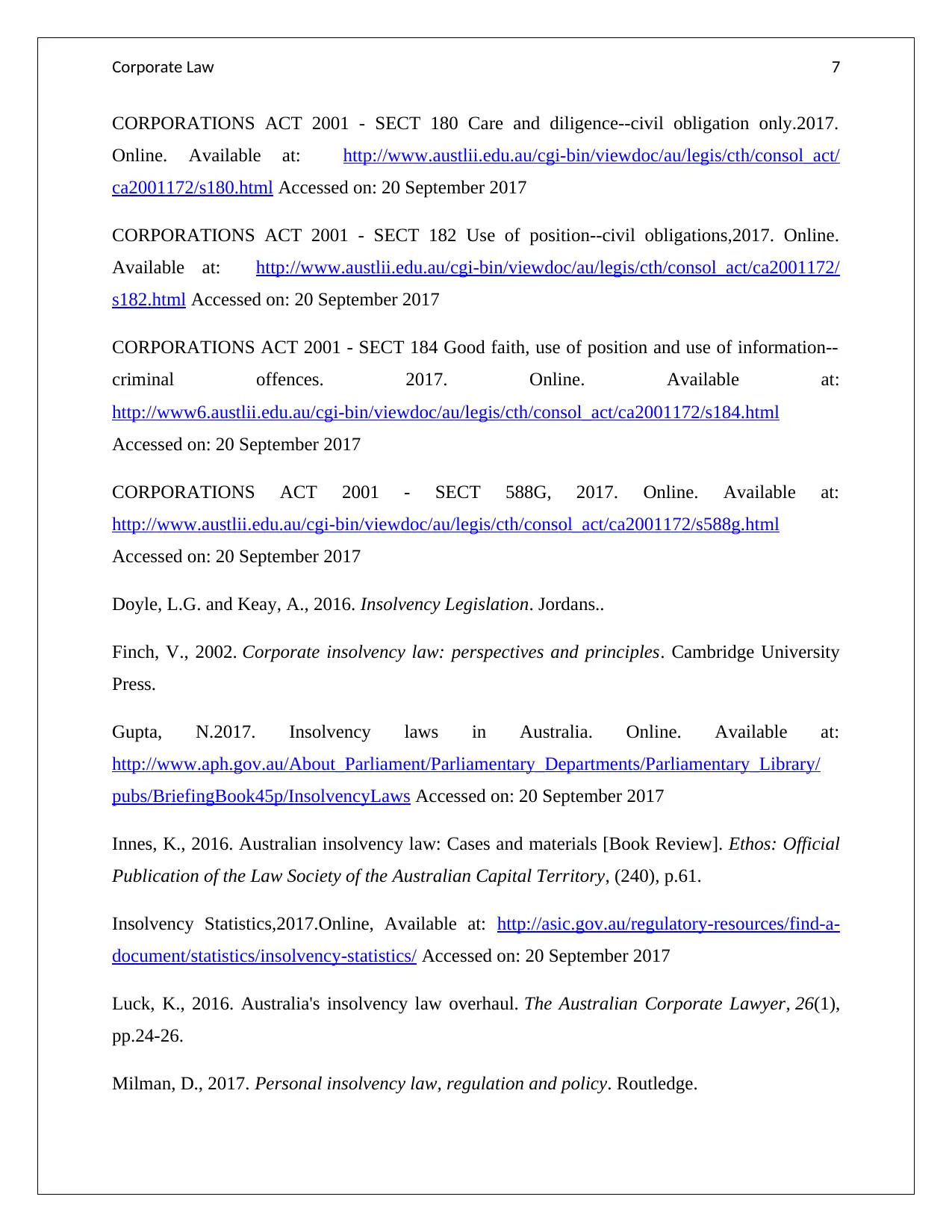
Corporate Law 7
CORPORATIONS ACT 2001 - SECT 180 Care and diligence--civil obligation only.2017.
Online. Available at: http://www.austlii.edu.au/cgi-bin/viewdoc/au/legis/cth/consol_act/
ca2001172/s180.html Accessed on: 20 September 2017
CORPORATIONS ACT 2001 - SECT 182 Use of position--civil obligations,2017. Online.
Available at: http://www.austlii.edu.au/cgi-bin/viewdoc/au/legis/cth/consol_act/ca2001172/
s182.html Accessed on: 20 September 2017
CORPORATIONS ACT 2001 - SECT 184 Good faith, use of position and use of information--
criminal offences. 2017. Online. Available at:
http://www6.austlii.edu.au/cgi-bin/viewdoc/au/legis/cth/consol_act/ca2001172/s184.html
Accessed on: 20 September 2017
CORPORATIONS ACT 2001 - SECT 588G, 2017. Online. Available at:
http://www.austlii.edu.au/cgi-bin/viewdoc/au/legis/cth/consol_act/ca2001172/s588g.html
Accessed on: 20 September 2017
Doyle, L.G. and Keay, A., 2016. Insolvency Legislation. Jordans..
Finch, V., 2002. Corporate insolvency law: perspectives and principles. Cambridge University
Press.
Gupta, N.2017. Insolvency laws in Australia. Online. Available at:
http://www.aph.gov.au/About_Parliament/Parliamentary_Departments/Parliamentary_Library/
pubs/BriefingBook45p/InsolvencyLaws Accessed on: 20 September 2017
Innes, K., 2016. Australian insolvency law: Cases and materials [Book Review]. Ethos: Official
Publication of the Law Society of the Australian Capital Territory, (240), p.61.
Insolvency Statistics,2017.Online, Available at: http://asic.gov.au/regulatory-resources/find-a-
document/statistics/insolvency-statistics/ Accessed on: 20 September 2017
Luck, K., 2016. Australia's insolvency law overhaul. The Australian Corporate Lawyer, 26(1),
pp.24-26.
Milman, D., 2017. Personal insolvency law, regulation and policy. Routledge.
CORPORATIONS ACT 2001 - SECT 180 Care and diligence--civil obligation only.2017.
Online. Available at: http://www.austlii.edu.au/cgi-bin/viewdoc/au/legis/cth/consol_act/
ca2001172/s180.html Accessed on: 20 September 2017
CORPORATIONS ACT 2001 - SECT 182 Use of position--civil obligations,2017. Online.
Available at: http://www.austlii.edu.au/cgi-bin/viewdoc/au/legis/cth/consol_act/ca2001172/
s182.html Accessed on: 20 September 2017
CORPORATIONS ACT 2001 - SECT 184 Good faith, use of position and use of information--
criminal offences. 2017. Online. Available at:
http://www6.austlii.edu.au/cgi-bin/viewdoc/au/legis/cth/consol_act/ca2001172/s184.html
Accessed on: 20 September 2017
CORPORATIONS ACT 2001 - SECT 588G, 2017. Online. Available at:
http://www.austlii.edu.au/cgi-bin/viewdoc/au/legis/cth/consol_act/ca2001172/s588g.html
Accessed on: 20 September 2017
Doyle, L.G. and Keay, A., 2016. Insolvency Legislation. Jordans..
Finch, V., 2002. Corporate insolvency law: perspectives and principles. Cambridge University
Press.
Gupta, N.2017. Insolvency laws in Australia. Online. Available at:
http://www.aph.gov.au/About_Parliament/Parliamentary_Departments/Parliamentary_Library/
pubs/BriefingBook45p/InsolvencyLaws Accessed on: 20 September 2017
Innes, K., 2016. Australian insolvency law: Cases and materials [Book Review]. Ethos: Official
Publication of the Law Society of the Australian Capital Territory, (240), p.61.
Insolvency Statistics,2017.Online, Available at: http://asic.gov.au/regulatory-resources/find-a-
document/statistics/insolvency-statistics/ Accessed on: 20 September 2017
Luck, K., 2016. Australia's insolvency law overhaul. The Australian Corporate Lawyer, 26(1),
pp.24-26.
Milman, D., 2017. Personal insolvency law, regulation and policy. Routledge.
Paraphrase This Document
Need a fresh take? Get an instant paraphrase of this document with our AI Paraphraser
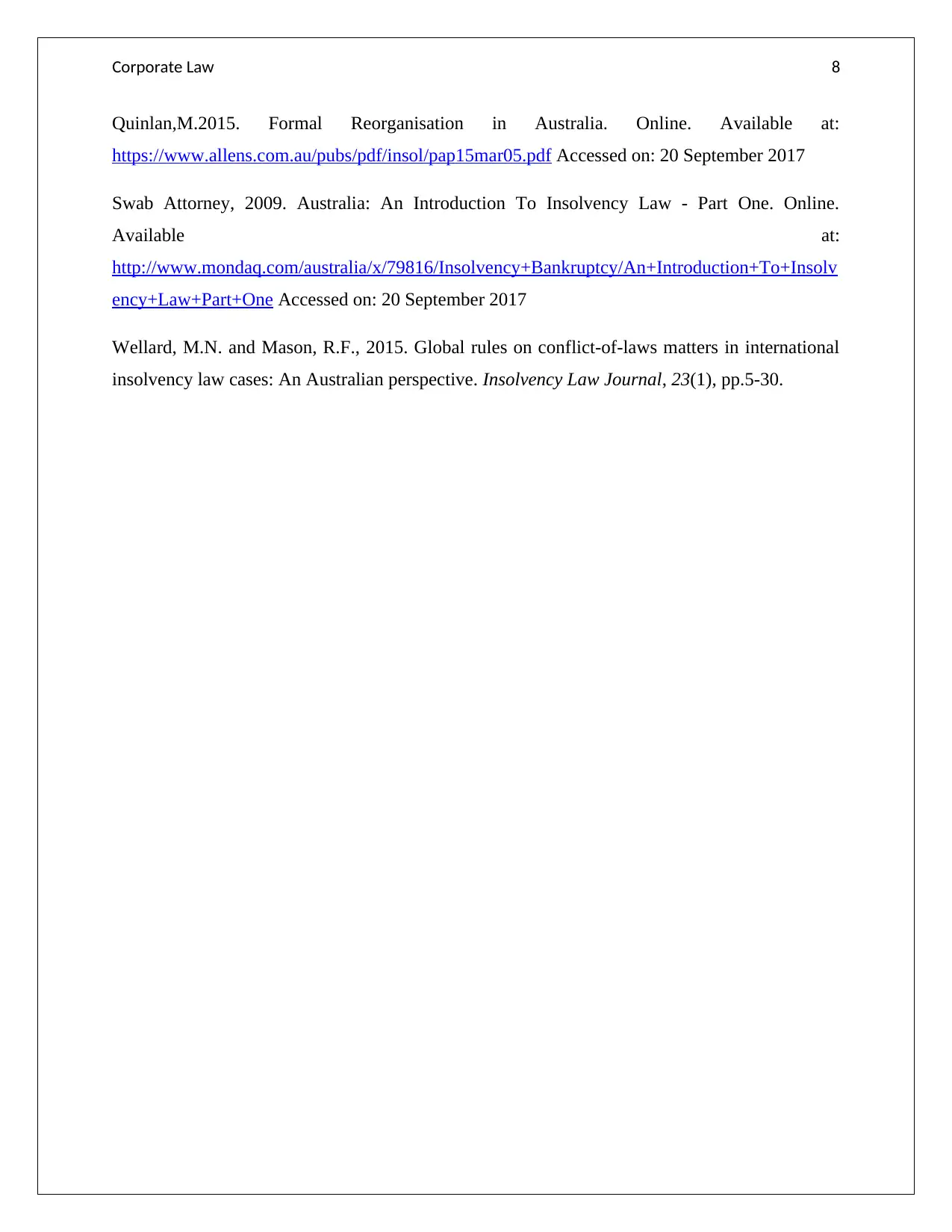
Corporate Law 8
Quinlan,M.2015. Formal Reorganisation in Australia. Online. Available at:
https://www.allens.com.au/pubs/pdf/insol/pap15mar05.pdf Accessed on: 20 September 2017
Swab Attorney, 2009. Australia: An Introduction To Insolvency Law - Part One. Online.
Available at:
http://www.mondaq.com/australia/x/79816/Insolvency+Bankruptcy/An+Introduction+To+Insolv
ency+Law+Part+One Accessed on: 20 September 2017
Wellard, M.N. and Mason, R.F., 2015. Global rules on conflict-of-laws matters in international
insolvency law cases: An Australian perspective. Insolvency Law Journal, 23(1), pp.5-30.
Quinlan,M.2015. Formal Reorganisation in Australia. Online. Available at:
https://www.allens.com.au/pubs/pdf/insol/pap15mar05.pdf Accessed on: 20 September 2017
Swab Attorney, 2009. Australia: An Introduction To Insolvency Law - Part One. Online.
Available at:
http://www.mondaq.com/australia/x/79816/Insolvency+Bankruptcy/An+Introduction+To+Insolv
ency+Law+Part+One Accessed on: 20 September 2017
Wellard, M.N. and Mason, R.F., 2015. Global rules on conflict-of-laws matters in international
insolvency law cases: An Australian perspective. Insolvency Law Journal, 23(1), pp.5-30.
1 out of 8
Related Documents
Your All-in-One AI-Powered Toolkit for Academic Success.
+13062052269
info@desklib.com
Available 24*7 on WhatsApp / Email
![[object Object]](/_next/static/media/star-bottom.7253800d.svg)
Unlock your academic potential
Copyright © 2020–2026 A2Z Services. All Rights Reserved. Developed and managed by ZUCOL.





